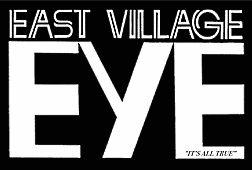East Village Eye
The East Village Eye was a cultural magazine, published by editor-in-chief Leonard Abrams, in circulation from May, 1979 until January, 1987. Based in the East Village section of New York City, the publication covered a range of locally focused topics, including art, politics and gentrification.[1] The East Village Eye, colloquially referred to as The Eye, covered topics such as the emergence of punk rock, hip hop and fashion as fringe pop culture, as well as the burgeoning art and nightlife scenes that highlighted NYC's East Village neighborhood during the 1980s.[2] The paper represented a confluence of popular culture, leftist politics and the artistically innovative.

History
Leonard Abrams started the East Village Eye after moving to the East Village in the mid-1970s. Its first office was at 167 Ludlow Street, moving repeatedly in and around this relatively inexpensive pocket of downtown Manhattan. Abrams' decision to feature artists from these emerging scenes, eschewing more established institutions, made The Eye a valuable cultural counterpoint. Over its span of 72 issues, the magazine was a platform to examine the contributions of visual and performance artists, musicians, cutting edge fashion design and photography, and neighborhood issues. The Eye was laced with wit, satire, sarcasm and written in a distinctly New York vernacular.
The Eye reached a peak circulation of 10,000 copies per month, available throughout New York City and outposts in San Francisco, Chicago, Los Angeles and Minneapolis. The magazine became a marketplace for the local economy, with neighborhood businesses purchasing ad space.[3] Groundbreaking small clubs, small arts publications and performance spaces like 8BC, ABC No Rio, Drink, Colab's A More Store, World War III Illustrated and Tellus Audio Cassette Magazine advertised in The Eye.
Editorial contributors
The list of East Village Eye contributors included Allen Ginsberg, Edit deAk, David Wojnarowicz, Glenn O'Brien, Cookie Mueller, Richard Hell, Lucy Lippard, and Rene Ricard, along with art direction and commissioned contributions by Christof Kohlhofer, Christy Rupp, Ellen Berkenblit and Futura 2000.
Featured visual artists
Artists such as Walter Robinson, Joseph Nechvatal, Becky Howland, Christof Kohlhofer, Futura 2000, Robert Goldman, Rick Prol, Christy Rupp, Ellen Berkenblit, Harvey Wang and John Sex received space in the magazine to publish their artwork, sometimes in a double page spread.
Featured musicians
Stalwarts and pioneers of the developing punk, post-punk, no wave, new wave and hip-hop scenes were also featured, including acts such as Run-DMC, Iggy Pop, John Cale, Fab Five Freddy, Annie Lennox, Nina Hagen, Beastie Boys, The Feelies, Billy Idol, The Lounge Lizards. John Zorn, Diamanda Galás, Kurtis Blow, Lou Reed and Debbie Harry (Blondie), among others. The Eye was the first publication to print and define the term "hip hop" in an interview between writer/subculturalist Michael Holman and one of the founding fathers of the movement, DJ Afrika Bambaataa.[4]
Featured fashion designers
The cutting edge of fashion took form in the pages of The Eye with the active participation of couturiers Sally Beers, Animal X, Betsey Johnson, Manic Panic, Natasha, Patricia Field, Trash and Vaudeville and many others from the South Bronx to the Lower East Side.
Featured filmmakers
Filmmakers highlighted included David Lynch, Dennis Hopper, Charlie Ahearn, Scott B and Beth B, Nick Zedd, Rainer Fassbinder, John Waters, Eric Mitchell, and Jim Jarmusch.
References
- "The East Village Eye: Where Art, Hip Hop, and Punk Collided" by Tiernan Morgan at Hyperallergic November 12, 2014
- "The East Village Eye: Where Art, Hip Hop, and Punk Collided" by Tiernan Morgan at Hyperallergic November 12, 2014
- "EV Grieve". evgrieve.com.
- "The East Village Eye: Where Art, Hip Hop, and Punk Collided". Hyperallergic.